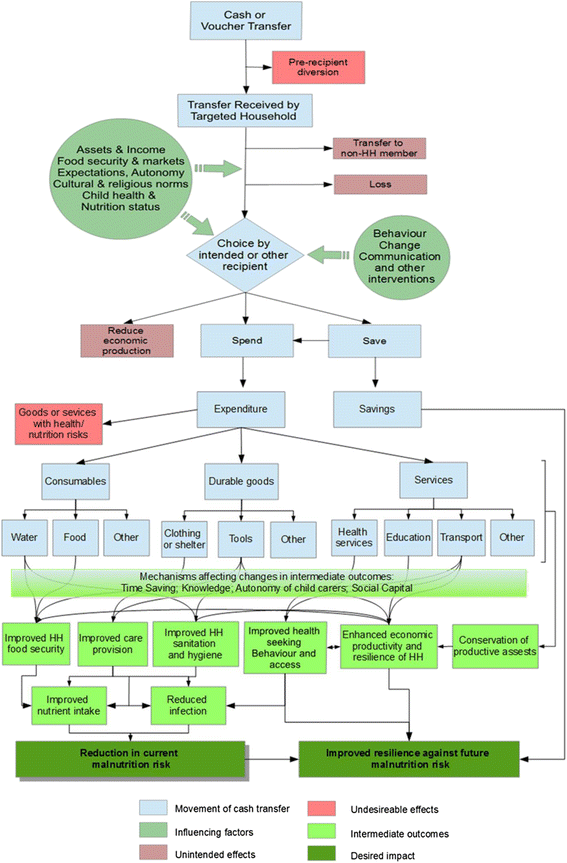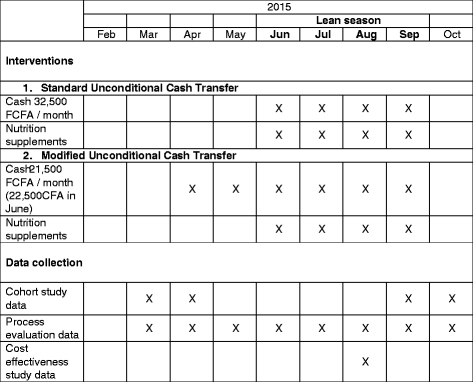The REFANI-N study protocol: a cluster-randomised controlled trial of the effectiveness and cost-effectiveness of early initiation and longer duration of emergency/seasonal unconditional cash transfers for the prevention of acute malnutrition among children, 6-59 months, in Tahoua, Niger
- PMID: 26700866
- PMCID: PMC4690269
- DOI: 10.1186/s12889-015-2640-2
The REFANI-N study protocol: a cluster-randomised controlled trial of the effectiveness and cost-effectiveness of early initiation and longer duration of emergency/seasonal unconditional cash transfers for the prevention of acute malnutrition among children, 6-59 months, in Tahoua, Niger
Abstract
Background: The global burden of acute malnutrition among children remains high, and prevalence rates are highest in humanitarian contexts such as Niger. Unconditional cash transfers are increasingly used to prevent acute malnutrition in emergencies but lack a strong evidence base. In Niger, non-governmental organisations give unconditional cash transfers to the poorest households from June to September; the 'hunger gap'. However, rising admissions to feeding programmes from March/April suggest the intervention may be late.
Methods/design: This cluster-randomised controlled trial will compare two types of unconditional cash transfer for 'very poor' households in 'vulnerable' villages defined and identified by the implementing organisation. 3,500 children (6-59 months) and 2,500 women (15-49 years) will be recruited exhaustively from households targeted for cash and from a random sample of non-recipient households in 40 villages in Tahoua district. Clusters of villages with a common cash distribution point will be assigned to either a control group which will receive the standard intervention (n = 10), or a modified intervention group (n = 10). The standard intervention is 32,500 FCFA/month for 4 months, June to September, given cash-in-hand to female representatives of 'very poor' households. The modified intervention is 21,500 FCFA/month for 5 months, April, May, July, August, September, and 22,500 FCFA in June, providing the same total amount. In both arms the recipient women attend an education session, women and children are screened and referred for acute malnutrition treatment, and the households receive nutrition supplements for children 6-23 months and pregnant and lactating women. The trial will evaluate whether the modified unconditional cash transfer leads to a reduction in acute malnutrition among children 6-59 months old compared to the standard intervention. The sample size provides power to detect a 5 percentage point difference in prevalence of acute malnutrition between trial arms. Quantitative and qualitative process evaluation data will be prospectively collected and programme costs will be collected and cost-effectiveness ratios calculated.
Discussion: This randomised study design with a concurrent process evaluation will provide evidence on the effectiveness and cost-effectiveness of earlier initiation of seasonal unconditional cash transfer for the prevention of acute malnutrition, which will be generalisable to similar humanitarian situations.
Trial registration: ISRCTN25360839, registered March 19, 2015.
Figures
Similar articles
-
The REFANI-S study protocol: a non-randomised cluster controlled trial to assess the role of an unconditional cash transfer, a non-food item kit, and free piped water in reducing the risk of acute malnutrition among children aged 6-59 months living in camps for internally displaced persons in the Afgooye corridor, Somalia.BMC Public Health. 2017 Jul 6;17(1):632. doi: 10.1186/s12889-017-4550-y. BMC Public Health. 2017. PMID: 28683834 Free PMC article. Clinical Trial.
-
Findings from a cluster randomised trial of unconditional cash transfers in Niger.Matern Child Nutr. 2018 Oct;14(4):e12615. doi: 10.1111/mcn.12615. Epub 2018 May 8. Matern Child Nutr. 2018. PMID: 29740973 Free PMC article. Clinical Trial.
-
The REFANI Pakistan study--a cluster randomised controlled trial of the effectiveness and cost-effectiveness of cash-based transfer programmes on child nutrition status: study protocol.BMC Public Health. 2015 Oct 12;15:1044. doi: 10.1186/s12889-015-2380-3. BMC Public Health. 2015. PMID: 26459336 Free PMC article. Clinical Trial.
-
Cash Transfers and Child and Adolescent Development.In: Bundy DAP, Silva ND, Horton S, Jamison DT, Patton GC, editors. Child and Adolescent Health and Development. 3rd edition. Washington (DC): The International Bank for Reconstruction and Development / The World Bank; 2017 Nov 20. Chapter 23. In: Bundy DAP, Silva ND, Horton S, Jamison DT, Patton GC, editors. Child and Adolescent Health and Development. 3rd edition. Washington (DC): The International Bank for Reconstruction and Development / The World Bank; 2017 Nov 20. Chapter 23. PMID: 30212143 Free Books & Documents. Review.
-
Effectiveness of cash-plus programmes on early childhood outcomes compared to cash transfers alone: A systematic review and meta-analysis in low- and middle-income countries.PLoS Med. 2021 Sep 28;18(9):e1003698. doi: 10.1371/journal.pmed.1003698. eCollection 2021 Sep. PLoS Med. 2021. PMID: 34582447 Free PMC article.
Cited by
-
A cash-based intervention and the risk of acute malnutrition in children aged 6-59 months living in internally displaced persons camps in Mogadishu, Somalia: A non-randomised cluster trial.PLoS Med. 2018 Oct 29;15(10):e1002684. doi: 10.1371/journal.pmed.1002684. eCollection 2018 Oct. PLoS Med. 2018. PMID: 30372440 Free PMC article. Clinical Trial.
-
The REFANI-S study protocol: a non-randomised cluster controlled trial to assess the role of an unconditional cash transfer, a non-food item kit, and free piped water in reducing the risk of acute malnutrition among children aged 6-59 months living in camps for internally displaced persons in the Afgooye corridor, Somalia.BMC Public Health. 2017 Jul 6;17(1):632. doi: 10.1186/s12889-017-4550-y. BMC Public Health. 2017. PMID: 28683834 Free PMC article. Clinical Trial.
-
Findings from a cluster randomised trial of unconditional cash transfers in Niger.Matern Child Nutr. 2018 Oct;14(4):e12615. doi: 10.1111/mcn.12615. Epub 2018 May 8. Matern Child Nutr. 2018. PMID: 29740973 Free PMC article. Clinical Trial.
-
Assessing the cost-effectiveness of interventions within a humanitarian organisation.Disasters. 2019 Jul;43(3):575-590. doi: 10.1111/disa.12344. Epub 2019 Apr 22. Disasters. 2019. PMID: 31012136 Free PMC article.
-
The gender, social and cultural influences on the management and use of unconditional cash transfers in Niger: a qualitative study.Public Health Nutr. 2017 Jun;20(9):1657-1665. doi: 10.1017/S1368980017000337. Epub 2017 Mar 6. Public Health Nutr. 2017. PMID: 28262087 Free PMC article.
References
-
- United Nations Children’s Fund, World Health Organization, The World Bank. UNICEFWHO-World Bank Joint Child Malnutrition Estimates. UNICEF, New York; WHO, Geneva; The World Bank, Washington, DC; 2012.
Publication types
MeSH terms
Associated data
LinkOut - more resources
Full Text Sources
Other Literature Sources
Medical
Miscellaneous



